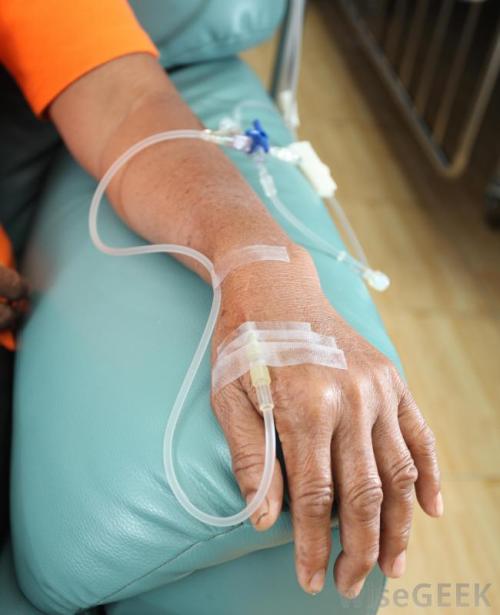
If there’s a word which is synonymous with cancer, it’s chemotherapy. It’s what most people have in their mind when they are talking to a cancer patient…… ‘have you had chemotherapy’ or ‘will you be getting chemotherapy’. I was nonchalantly asked by a friend some time ago ‘how did you get on with chemotherapy’ – he was surprised to hear I hadn’t had it despite my widespread disease. Cue – lengthy explanation!
I wasn’t annoyed by the question, I just think people automatically assume every cancer patient has to undergo some form of systemic chemotherapy. If you read any newspaper article about cancer, they do nothing to dispel that myth, as many articles contain a story about a cancer patient with no hair.
Sure, chemotherapy is not the nicest treatment to receive and it does have pretty awful side effects for most. I watched my daughter-in-law go through 3 or 4 months of this treatment where she was literally confined to a combination of her bedroom and her bathroom. And it did shock me to see her without hair. I would never want anyone to go through that and it really brings it home when it happens to a close member of your family.
Despite its bad press in regards toxicity and it’s awful side effects, chemotherapy is widely used in many cancers. Statistics show that it does work for many patients (….. my daughter-in-law is still here looking after two of my four grandsons and my son still has a wife ♥). However, I suspect it has a limited future as more efficient and less toxic drugs and delivery systems come online downstream. Immunotherapy is often touted as a replacement for chemotherapy but this may be a while yet. So for now, millions of cancer patients worldwide will continue to be prescribed chemotherapy as part of their treatment regime.
However, for some cancers, chemotherapy is not particularly effective. Neuroendocrine Cancer (NETs) is one such cancer. In general, NETs do not show a high degree of sensitivity to chemotherapy. As a consequence, it’s often inadequate for treatment of well-differentiated tumours with a low proliferation index. The one exception is for Grade 3 or poorly differentiated tumours (known as Neuroendocrine Carcinoma) where chemotherapy is much more likely to feature. I’m not saying that the lower grades will never receive chemotherapy – that door is always left open for those with progressive cancer who have run out of treatment options. Putting Grade 3 to one side, I’ve heard people say that NETs is the ‘good‘ cancer or the ‘good looking’ cancer often citing the chemotherapy thing as some justification. That is of course a stupid thing to say.
Here’s the rub. Many other treatments also come with pretty challenging side effects, not just chemotherapy. Moreover, the side effects and consequencesof these other treatments can last for some time, and for many, a lifetime. For example with NETs:
Surgery can be pretty extensive. Many cancer patients receive surgery and for NETs, that is said to be the only real ‘curative’ treatment, although for most, it’s cytoreductive or palliative in nature. If you lose parts of your small intestine, large intestine, liver, spleen, cecum and appendix, gallbladder, stomach, rectum, lungs, pancreas, thyroid, parathyroids, pituitary gland, adrenal gland, thymus gland, ovaries, oesophagus…….(I could go on) ………….. then these come with various side effects which can present some quality of life issues.
Other ‘consequences’ of cancer surgery include (but are not limited to), pulmonary emboli (blood clots), lymphedema, short bowel syndrome, gastrointestinal malabsorption, diabetes.
Somatostatin Analogues do a great job but they do add to some of the effects of surgery (mainly malabsorption).
Even the so-called ‘silver bullet’ treatment Peptide Receptor Radio Nuclide Therapy (PRRT) has side effects and presents some risk to kidneys and bone marrow.
I’ve not had chemotherapy and I don’t want to have it either. However, there are other harsh treatments out there and not everyone will lose their hair through these treatments. Moreover, many people have to live for long periods with the consequences of their cancer treatment. I wish someone would write an article about my lack of terminal ileum and ascending colon, my missing mesenteric lymph nodes, my retroperitoneal fibrosis, not to mention my diseased liver, my left axillary lymph nodes (and the mild lymphedema I now have after their removal), my left supraclavicular lymph nodes, my suspect thyroid lesion, my small lung nodule and my pulmonary emboli which after nearly 6 years of daily injections means my abdomen looks and feels like I’ve done 12 rounds with Mike Tyson. However, it just wouldn’t be a good picture nor would it be as powerful as one of a person with no hair. Just saying!
I look well, I still have all my hair – but you should see my insides!
I wish all cancer patients the best for their treatments!
thanks for listening
Ronny
Hey Guys, I’m also active on Facebook. Like my page for even more news.
My Diagnosis and Treatment History – check out my Diagnosis Video
Please help me with my 2017 campaigns to accepting this invite on Facebook:
Whatever cancer throws your way, we’re right there with you.
We’re here to provide physical, financial and emotional support.
© Macmillan Cancer Support 2024 © Macmillan Cancer Support, registered charity in England and Wales (261017), Scotland (SC039907) and the Isle of Man (604). Also operating in Northern Ireland. A company limited by guarantee, registered in England and Wales company number 2400969. Isle of Man company number 4694F. Registered office: 3rd Floor, Bronze Building, The Forge, 105 Sumner Street, London, SE1 9HZ. VAT no: 668265007